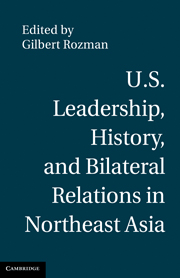Book contents
- Frontmatter
- Contents
- List of Contributors
- Acknowledgments
- U.S. Leadership, History, and Bilateral Relations in Northeast Asia
- Introduction
- PART I HISTORICAL MEMORIES AND BILATERAL TIES WITH ALLIES
- PART II HISTORICAL MEMORIES, JAPANESE–SOUTH KOREAN RELATIONS, AND U.S. VALUES
- PART III HISTORICAL MEMORIES, SINO–SOUTH KOREAN RELATIONS, AND U.S. VALUES
- 7 Sino–South Korean Differences over Koguryo and the U.S. Role
- 8 New Grounds for Contestation
- 9 U.S. Strategic Thinking on Sino–South Korean Differences over History
- Index
9 - U.S. Strategic Thinking on Sino–South Korean Differences over History
from PART III - HISTORICAL MEMORIES, SINO–SOUTH KOREAN RELATIONS, AND U.S. VALUES
Published online by Cambridge University Press: 01 March 2011
- Frontmatter
- Contents
- List of Contributors
- Acknowledgments
- U.S. Leadership, History, and Bilateral Relations in Northeast Asia
- Introduction
- PART I HISTORICAL MEMORIES AND BILATERAL TIES WITH ALLIES
- PART II HISTORICAL MEMORIES, JAPANESE–SOUTH KOREAN RELATIONS, AND U.S. VALUES
- PART III HISTORICAL MEMORIES, SINO–SOUTH KOREAN RELATIONS, AND U.S. VALUES
- 7 Sino–South Korean Differences over Koguryo and the U.S. Role
- 8 New Grounds for Contestation
- 9 U.S. Strategic Thinking on Sino–South Korean Differences over History
- Index
Summary
History serves as a contentious arena for explaining the world as it is and as it is desired. In October 2009, Chinese, Japanese, and South Koreans made plans to write a joint textbook recognizing the shared history of their countries and helping to realize an East Asian community. In the tradition of new regimes steeped in the Confucian heritage, a didactic history would serve a legitimating purpose. Yet, it could also pose a challenge to U.S.-centered histories of the twentieth-century struggle for freedom and to efforts to look ahead toward globalization based on universal values. China's thinking about the past is at the center of this struggle between rival histories, and its recent disputes with South Korea over an ancient kingdom are instructive for understanding what is at stake.
The Hu Jintao era reveals an increasingly assertive China in international affairs, striving to counter U.S. power around the globe while drawing neighboring states closer in a regional community. Much has been written about China's use of economic power and its buildup of military power, as its search for soft power also has not been ignored. Yet, discussions of soft power have little to say about the way China handles historical memories, even with the two countries most often associated with its Confucian tradition and its twentieth-century wars. To the extent history is covered, it is centered on Japan's need to apologize and reassure the Chinese people. Missing is how China deals with issues from its own imperial assertiveness.
- Type
- Chapter
- Information
- Publisher: Cambridge University PressPrint publication year: 2010



